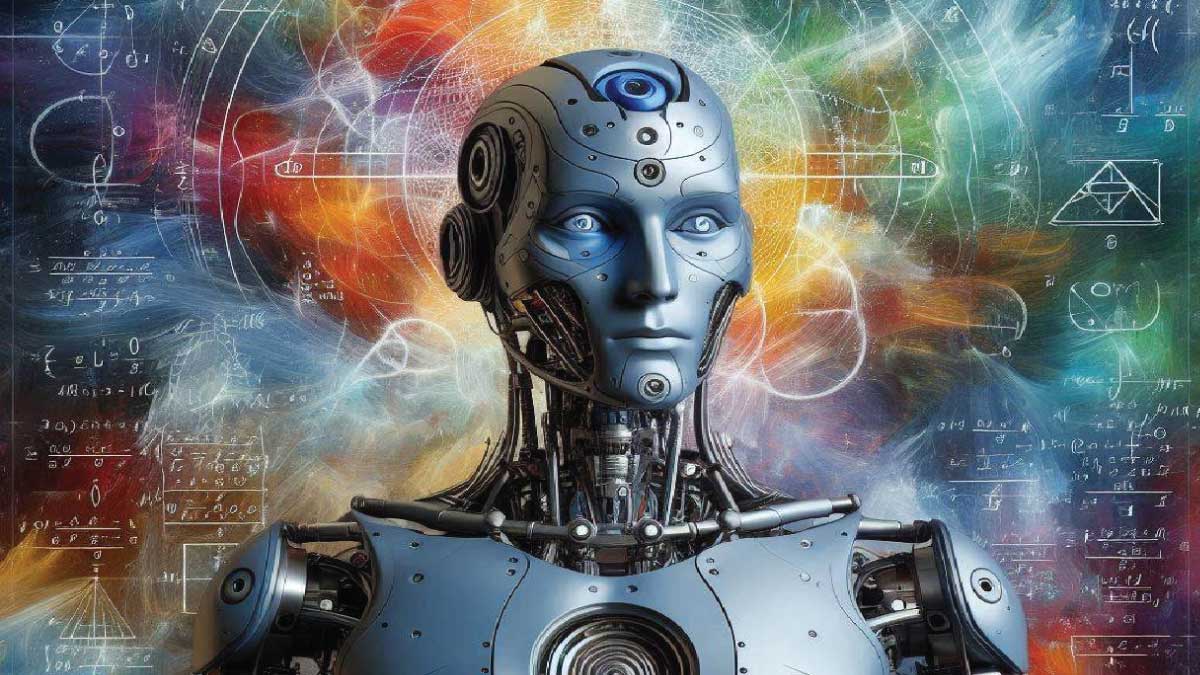Artificial intelligence (AI) is rapidly transforming our world. It’s not just about robots with human-like minds, but a range of technologies that can learn, analyze data, and make decisions.
There are various types of AI:
- Simple reactive systems: Think traffic light controllers responding to traffic flow.
- Learning machines: Self-driving cars use sensors and past data to navigate.
- Advanced AI: Deep learning powers facial recognition and medical image analysis.
AI’s impact is vast:
- Healthcare: AI assists in diagnosis, treatment plans, and patient care.
- Finance: AI helps detect fraud, manage risk, and personalize investment advice.
- Transportation: Self-driving cars and traffic management rely on AI.
- Retail: AI personalizes shopping experiences, forecasts demand, and manages inventory.
- Education: AI tailors learning, provides tutoring, and automates tasks.
AI holds immense potential to solve complex problems, improve efficiency, and enhance our lives. As AI evolves, responsible development is crucial.
Definition of Artificial Intelligence (AI)
At its core, Artificial Intelligence aims to enable machines to perform tasks that would typically require human intelligence. These tasks include problem-solving, decision-making, understanding natural language, recognizing patterns, and learning from experience. AI systems can analyze vast amounts of data, identify trends and insights, and make predictions based on the information they gather.
7 Types of Artificial Intelligence (AI) Shaping Our World
Artificial intelligence (AI) is rapidly transforming our world, impacting everything from how we interact with technology to how businesses operate. While the concept of AI often conjures images of robots with human-like intelligence, the reality is more nuanced. Here, we explore seven key types of AI that are shaping our present and future:
1. Reactive Machines:
These are the simplest form of AI, reacting to their environment without any memory of past experiences. Think of a chess program that chooses its next move based solely on the current board state. Traffic light controllers that adjust light timing based on real time traffic flow are another example. These AI excel at specific tasks within a limited context.
2. Limited Memory Machines:
Taking a step forward, these AI can store and utilize past information to make better decisions. Self-driving cars epitomize this category. They use a combination of sensors (cameras, LiDAR) to perceive the environment in real-time and leverage past experiences (recorded data) to navigate safely. Similarly, recommendation systems on e-commerce platforms analyze your past purchases and browsing history to suggest relevant products.
3. Reinforcement Learning AI:
This type of AI learns through trial and error, interacting with its environment and receiving rewards for desired behavior. AlphaGo, the AI program that defeated the world champion in Go, is a prime example. By playing countless games against itself, it learned optimal strategies. Similarly, AI for video game characters can learn to adapt their playing style based on the player’s actions.
4. Machine Learning AI:
This broad category encompasses AI that learns from data. Subsets include supervised learning (learning from labeled data), unsupervised learning (finding patterns in unlabeled data), and semi-supervised learning (combining labeled and unlabeled data). Facial recognition software, spam filters, and stock market prediction models all leverage various forms of machine learning.
5. Natural Language Processing (NLP) AI:
This type of AI focuses on understanding and manipulating human language. Chatbots that answer customer queries, voice assistants like Siri and Alexa, and machine translation tools all rely on NLP. NLP AI is constantly evolving, aiming to achieve more nuanced understanding and natural-sounding communication.
6. Deep Learning AI:
A subfield of machine learning, deep learning utilizes artificial neural networks inspired by the human brain. These complex networks can learn intricate patterns from massive datasets, enabling breakthroughs in areas like image recognition (facial recognition, medical image analysis) and natural language processing (sentiment analysis, machine translation).
7. Artificial General Intelligence (AGI):
This hypothetical type of AI would possess human-level intelligence, capable of learning any intellectual task a human can. AGI doesn’t exist yet, and there’s ongoing debate about its feasibility. However, research in areas like deep learning and artificial consciousness paves the way for potential future advancements.
Understanding these different types of AI helps us appreciate the vast spectrum of its capabilities. From simple reactive systems to complex learning machines, AI plays an increasingly important role in our lives. As AI continues to evolve, it’s crucial to consider the ethical implications and ensure its responsible development for a better future.
Uses of Artificial Intelligence (AI)
Healthcare
Artificial intelligence (AI) is revolutionizing healthcare by enabling more accurate diagnosis, personalized treatment plans, and predictive analytics. Machine learning algorithms can analyze medical images, detect anomalies, and assist healthcare professionals in making informed decisions. AI-powered chatbots and virtual assistants are also transforming patient engagement and care delivery.
Finance
In the finance industry, Artificial intelligence (AI) is used for fraud detection, risk assessment, algorithmic trading, and customer service automation. Machine learning algorithms analyze financial data in real-time to identify fraudulent activities and mitigate risks. AI-driven robo-advisors provide personalized investment advice based on individual preferences and financial goals.
Transportation
Autonomous vehicles are one of the most prominent applications of Artificial intelligence (AI) in transportation. Self-driving cars use sensors, cameras, and machine learning algorithms to perceive their environment, navigate roads, and make driving decisions. AI is also used in traffic management systems, route optimization, and predictive maintenance of vehicles and infrastructure.
Retail
Artificial intelligence (AI) is reshaping the retail industry by enabling personalized shopping experiences, demand forecasting, and inventory management. Recommendation systems use machine learning algorithms to analyze customer data and suggest products tailored to individual preferences. AI-powered chatbots assist customers with product inquiries, order tracking, and customer support.
Education
In education, Artificial intelligence (AI) is used to personalize learning experiences, provide adaptive tutoring, and automate administrative tasks. Intelligent tutoring systems analyze student performance data to deliver customized learning materials and assessments. AI-driven virtual classrooms facilitate remote learning and collaboration among students and educators.
Conclusion
Artificial Intelligence (AI) is a transformative technology with the potential to revolutionize every aspect of our lives. From healthcare and finance to transportation and retail, AI is driving innovation and shaping the future of industries. By understanding the definition, types, and applications of AI, we can harness its power to solve complex problems, improve efficiency, and enhance human experiences.
Most Reads:
How is AI being used in different industries?
AI: Revolutionizing Industries Through the Power of Technology
Advanced Manufacturing Technology: Revolutionizing Industries
FAQs:
What is Artificial Intelligence (AI)?
Artificial Intelligence, or AI, refers to the simulation of human intelligence in machines programmed to perform tasks that typically require human intelligence, such as learning, problem-solving, and decision-making. AI encompasses various technologies, including machine learning, natural language processing, computer vision, and robotics.
What are the different types of AI?
There are four main types of AI: Reactive Machines, Limited Memory AI, Theory of Mind AI, and Self-Aware AI. Reactive Machines react to specific situations based on predefined rules. Limited Memory AI learns from past experiences and historical data. Theory of Mind AI attributes mental states to oneself and others. Self-Aware AI possesses consciousness and self-awareness akin to humans.
What are some common applications of AI?
AI finds applications across various industries, including healthcare (diagnosis, treatment planning), finance (fraud detection, algorithmic trading), transportation (autonomous vehicles, route optimization), retail (personalized shopping experiences, demand forecasting), and education (adaptive tutoring, administrative automation).
What are the ethical considerations surrounding AI?
Ethical considerations in AI include issues such as bias in algorithms, data privacy, job displacement, and autonomous weapon systems. It’s essential to develop ethical frameworks and regulations to ensure that AI technologies are used responsibly and ethically, addressing concerns about fairness, transparency, and accountability.
What are the challenges and opportunities associated with AI?
Challenges in AI include transparency and interpretability of AI systems, societal impacts such as job displacement, and ethical dilemmas surrounding the development and deployment of AI. However, AI also presents significant opportunities for innovation, efficiency improvement, and solving complex problems across various domains.

ZAK Engineer is an experienced engineer with 15 years in the mechanical and industrial sectors. Holding advanced degrees and multiple certifications in engineering, he combines technical expertise with a passion for writing to provide valuable insights into engineering innovations and business strategies. His content empowers professionals to excel in their fields and stay updated with the latest industry trends.

